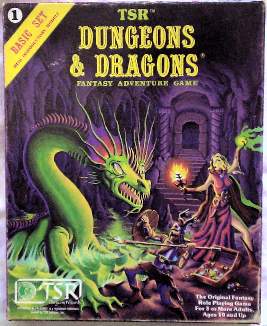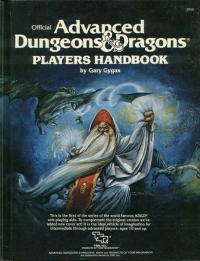In my “house rules” post I took a stab at adding a spellcasting time requirement (as Rule #4).
The reason I added this was because, as written, there IS NO POSSIBILITY of interrupting a spell being cast. The only thing that can be done is to attempt to cause a spell effect to end early, IF the spell requires concentration.
However, my first thought on how long to make the required spellcasting time (one 6-second combat round per spell-level) is probably excessive in most cases. It could lead to spellcasters being “nerfed” instead of merely “reigned in” (which was my intention).
So here are a few thoughts on alternative ways of figuring the required casting time.
1) The first thing that popped into my head was actually just to take the casting times from 1st or 2nd Edition AD&D.
1st Edition AD&D has combat rounds of 1 minute, that are broken down into ten “segments” of 6 seconds each. Many spells in 1st Edition have casting times specified in segments, which would seem to map nicely to the 5th Edition combat round of 6 seconds.
2nd Edition AD&D kept 1-minute rounds, but did away with segments. Instead, the initiative system worked on a “count” or “impulses” system. You rolled a d10, and added the speed factor of your weapon or casting time of your spell; your action occurred when that number was reached in the count. The lower your initiative total, the sooner you went. Similarly to 1st Edition, this concept seems to map fairly well to the 5th Edition combat rounds.
I actually had this idea before the version of House Rule #4 I put in the post. Why didn’t I just use this instead?
I wanted to avoid referencing another edition if at all possible. Mainly because having to look up casting times would slow play and jar with the 5E rules style of minimizing exceptions & special cases in favor of more general procedures.
2) Another alternative would be to require “actions” instead of “rounds.” This would automatically pretty much halve the spellcasting times from my Rule #4 (since my understanding is characters get both a standard and bonus action in each round). Also, as characters get more powerful they might gain more actions per round, which would also reduce spellcasting times for more experienced spellcasters.
Until I have some actual play experience with 5th Edition, I am not really sure how the “action economy” works in practice. So I am not sure if this would work as intended or not.
3) A third alternative would be to make up a chart, along the line of: 1st – 3rd level spells require 1 combat round, 4th – 6th level spells would require 2 rounds, 7th – 9th level spells would require 3 rounds.
Although this generally would reduce casting time compared to my Rule #4, I think the idea of such a fixed progression is too strict. In previous editions, some spells were always just able to be cast faster than others.
One thing that none of these ideas addresses, is the idea of reaction spells and counterspelling. This entire idea just did not exist in the older editions I am most familiar with. (The best you could do was cast Dispel Magic AFTER the other guy’s spell was already cast.) Again it interfaces with the 5th Edition “action economy” in some way, and I would have to see how it actually works before trying to tinker with it.
Just tossing out ideas for future thought.
Although I am hoping that there will be some sort of option addressing this in the core books when they come out.




















